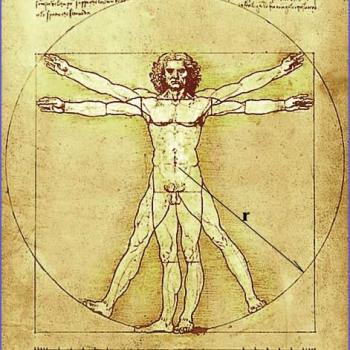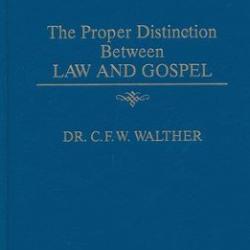In some contemporary debates regarding the third use of the Law, it is contended that Article VI of the Formula of Concord does not promote a positive use of the Law, whereby the Christian is guided in his daily walk in light of the Gospel. Rather, it is simply stating that the Christian is simul, both saint and sinner, and thus still needs the Law. The Law then functions only externally, to force the old man into obedience. The definition of the third use that one often finds in Lutheran Scholastic theology is then seen as a misuse of the Formula of Concord.
To gain understanding of the Confessional teaching on the Third Use of God’s Law, one does not need to go to the Formula of Concord. Rather, Luther’s Large Catechism expounds heavily upon the use of the Law in the Christian life. In Luther’s view, this does not only include condemning, but the Law actually serves a positive function in guiding the Christian in God’s will. The Ten Commandments, in Luther’s Catechism, begin with the first, which is primarily explained as trust in God. Luther explains:
Therefore, let us learn the First Commandment well, so that we see that God will tolerate no presumption or trust in anything else; he makes no greater demand on us than a heartfelt trust in him for every good thing, so that we walk straight ahead on the right path, using all of God’s gifts exactly as a shoemaker uses a needle, awl, and thread for his word and afterward puts them aside, or as a traveler makes use of an inn, food, and lodging, but only for his physical needs. Let each person do the same in his or her walk of life according to God’s order, allowing none of these things to be a Lord or an idol. (LC First Part, 47).
The First Commandment is portrayed in a positive light, as heartfelt trust in God by which one is then able to walk along the “right path” as one is given God’s gift. These gifts are what allow one to “do the same in his or her life according to God’s order.” Luther is utilizing the First Commandment in a positive sense, giving direction to believers.
In discussing the second commandment, Luther explains that these commandments must continually be pushed upon children, so that they might be obeyed:
Above all else, therefore, our young people should be strictly required and trained to hold this as well as the other commandments in high regard. Whenever they violate them, we must be after them at once with the rod, confront them with the commandment, and continually impress it upon them, so that they may be brought up not merely with punishment but with reverence and fear of God. (LC First Part, 61).
It is part of Christian duty to obey God’s Law. The motivation here is partially said to be fear of punishment, but one’s reverence for God also serves as a motive for being obedient to God’s commandments. It is a continual theme of Luther that commandments must not only be urged with threats of punishment (first use), but they must also take root in the heart so that one obeys the Law willingly (third use).
See, with simple and playful methods like this we should bring up young people in the fear and honor of God so that the First and Second Commandments may become familiar and constantly practices. Then some good may take root, spring up, and bear fruit, and people may grow to adulthood who may give joy and pleasure to an entire country. That would also be the right way to bring up children, while they may be trained with kind and agreeable methods. For what a person enforces by means of beatings and blows will come to no good end. At best, the children will remain good only as long as the rod is on their backs. But this kind of training takes root in their hearts so that they fear God more than they do rods and clubs. (LC First Part, 75-77 )
Luther argues here that the Law most both be taught with threatenings, and also must be ingrained into the heart due to the fear of God. Again, it is demonstrably clear that the Law does not only serve a negative function in Christian training. He says something similar regarding the fourth commandment:
For God’s sake, therefore, let us finally learn that the young people should banish all other things from their sight and give first place to this commandment. If they wish to serve God with truly good works, they must do what is pleasing to their fathers and mothers, or to those to whom they are subject in their stead. For every child who knows and does this has, in the first place, the great comfort of being able joyfully to boast in defiance of all who are occupied with works of their own choice: “See, this work is well-pleasing to my God in heaven; this I know for certain.” (LC First Part, 115).
In this section, good works are said to be something that the child is to rejoice in. They are called to obey this specific commandment, and they have full assurance, when doing it, that they are pleasing God with their good work. Luther further says that “For this reason you should rejoice from the bottom of your heart and give thanks to God that he has chosen and made you worthy to perform works so precious and pleasing to him” (LC First Part, 117). God uses his Word to “encourage and urge us to true, noble, exalted deeds, such as gentleness, patience, and, in short, love and kindness toward our enemies. He always wants to remind us to recall the First Commandment, that he is our God; that is, that he wishes to help, comfort, and protect us, so that he may restrain our desire for revenge.” (LC First Part, 195). The Law does not simply restrain the old man, but it instructs the Christian and urges him to perform these good deeds.
Luther summarizes the Ten Commandments with the following statement:
Here, then, we have the Ten Commandments, a summary of divine teaching on what we are to do to make our whole life pleasing to God. They are the true fountain from which all good works must flow. Apart from these Ten Commandments no action or life can be good or pleasing to God, no matter how great or precious is may be in the eyes of the world. (LC First Part, 311)
These commandments do not only force good works by threats, but as Luther says: “these words contain both a wrathful threat and a friendly promise, not only to terrify and warn us but also to attract and allure us, so that we will receive and regard God’s Word as seriously as he does” (LC First Part, 322). These commandments are to be continually urged unto Christians, not only to show them their sin, but:
we are to keep them incessantly before our eyes and constantly in our memory and to practice them in all our works and ways. Each of us is to make them a matter of daily practice in all circumstances, in all activities and dealings, as if they were written everywhere we look, even wherever we go or wherever we stand. Thus, both for ourselves at home and abroad among our neighbors, we will find occasion enough to practice the Ten Commandments, and no one need search far for them. (LC First Part, 330-332)
Some would urge that the Ten Commandments are expounded, not so that Christians might be urged to obey them, but to demonstrate that we cannot obey them. This is why the commandments precede the Creed. While it is certainly true that the Law is placed before the Gospel in Luther’s catechisms because the Law must reveal our sin prior to hearing the Gospel, that is not the only reason. Luther says that the Creed:
is given in order to help us do what the Ten Commandments require of us. For, as we said above, they are set so high that all human ability is far too puny and weak to keep them. Therefore it is just as necessary to learn this part as it is the other so that we may know where and how to obtain the power to do this. If we were able by our own strength to keep the Ten Commandments as they ought to be kept, we would need nothing else, neither the Creed nor the Lord’s Prayer. (LC Second Part, 2-3)
The Gospel is presented in the Creed as both for the forgiveness of one’s failure to obey the Law, and as that which gives power to begin to obey the Law. The Lord’s Prayer serves the same function. Luther writes: “nothing is so necessary as to call upon God incessantly and to drum into his ears our prayer that he may give, preserve, and increase in us faith and the fulfillment of the Ten Commandments and remove all that stands in our way and hinders us in this regard” (LC Third Part, 2).
It is clear that the Law does not serve a purely negative function in Luther’s Large Catechism. God’s commandments are good, and should be urged upon all Christians. They serve not only to show us our sin, or simply that we might beat our sinful flesh, but also as a guide whereby Christians know the will of their Heavenly Father.















